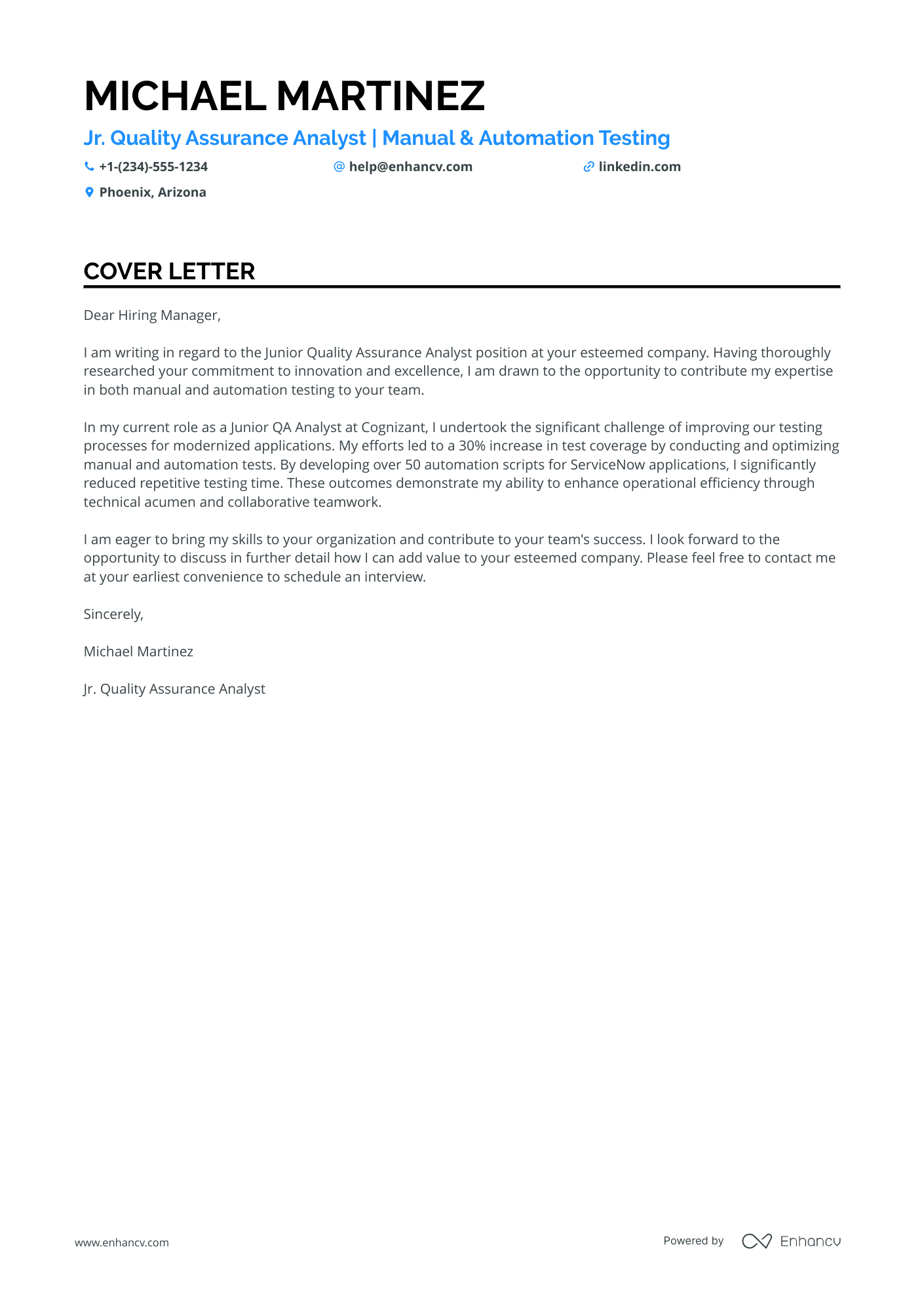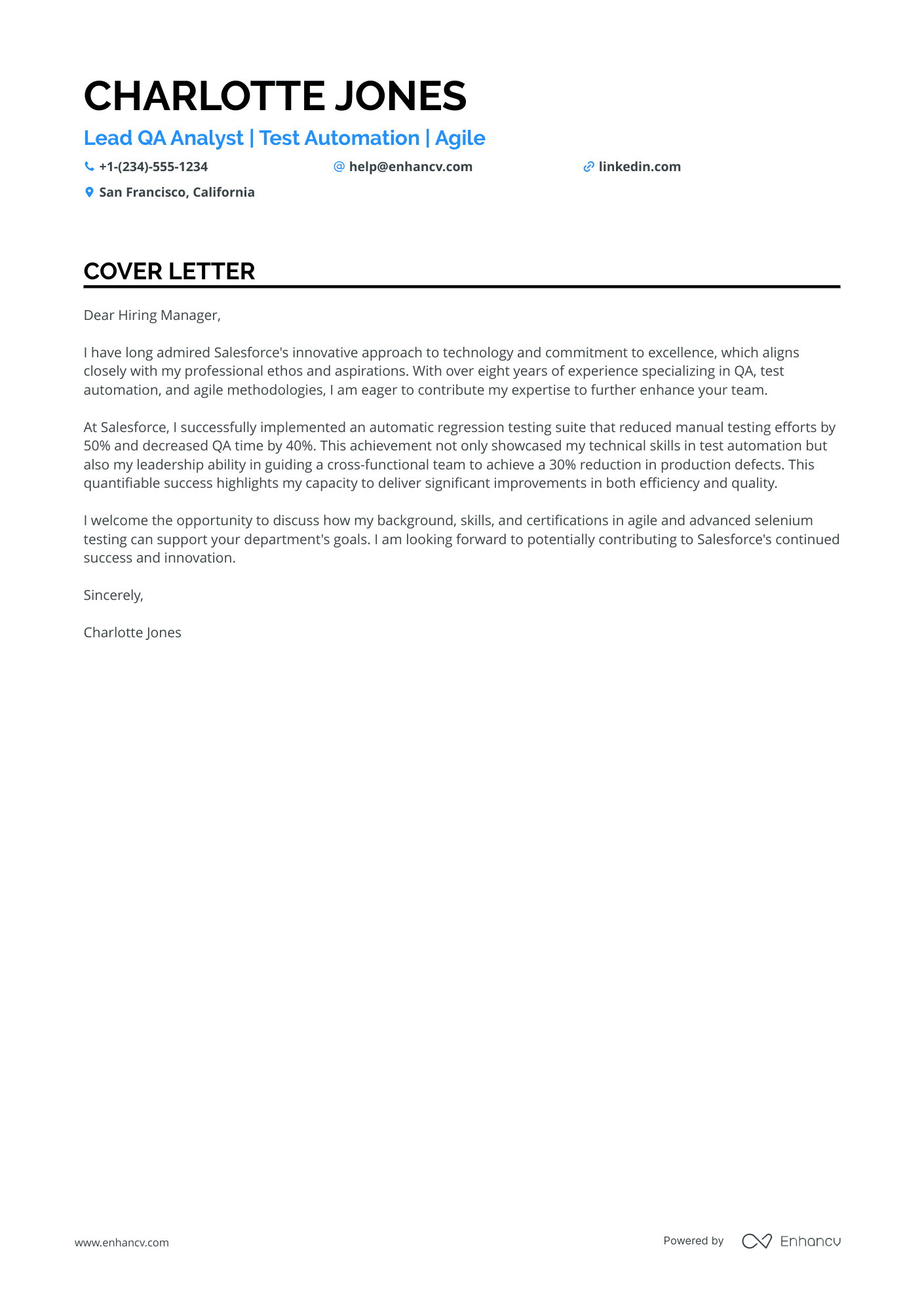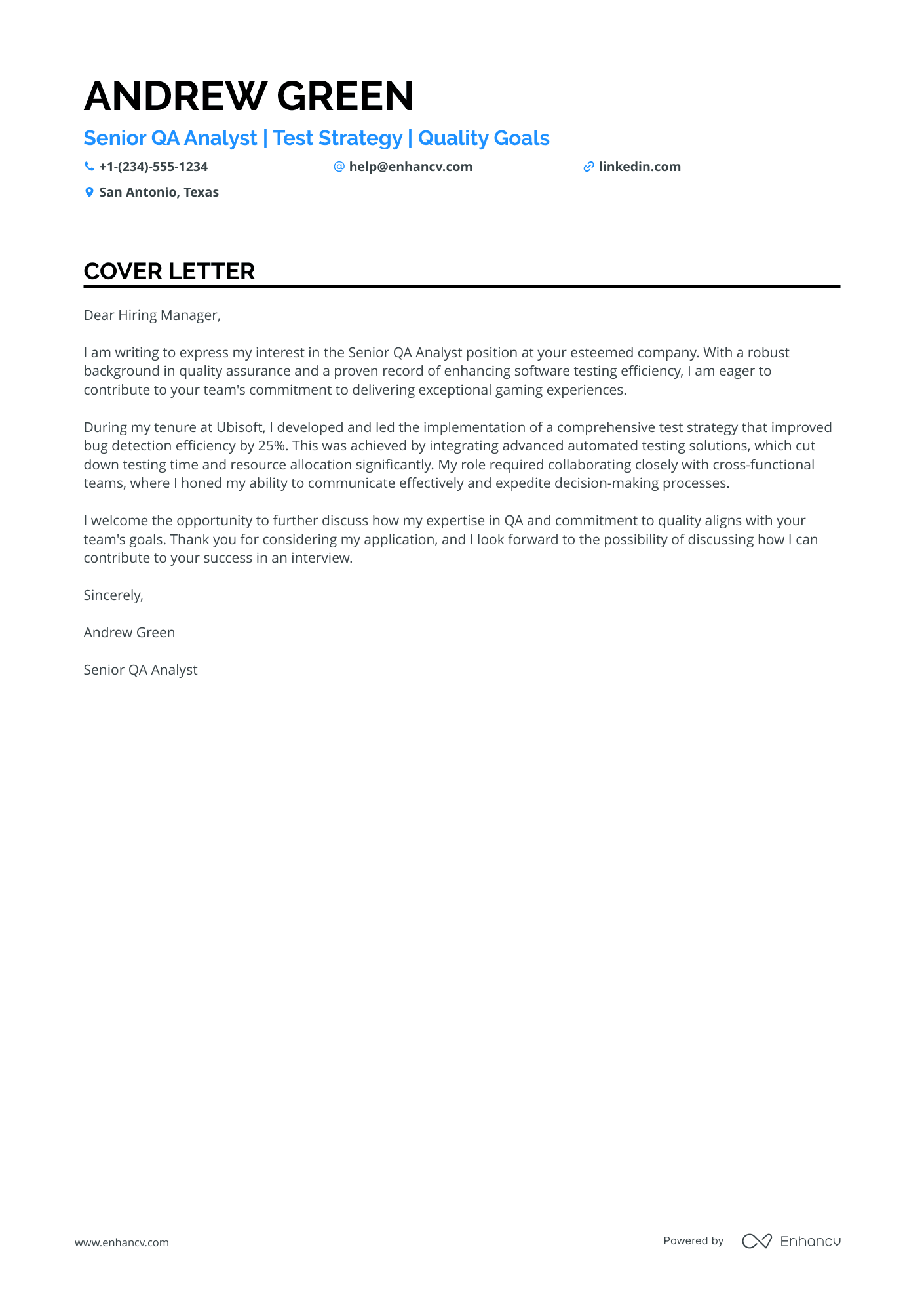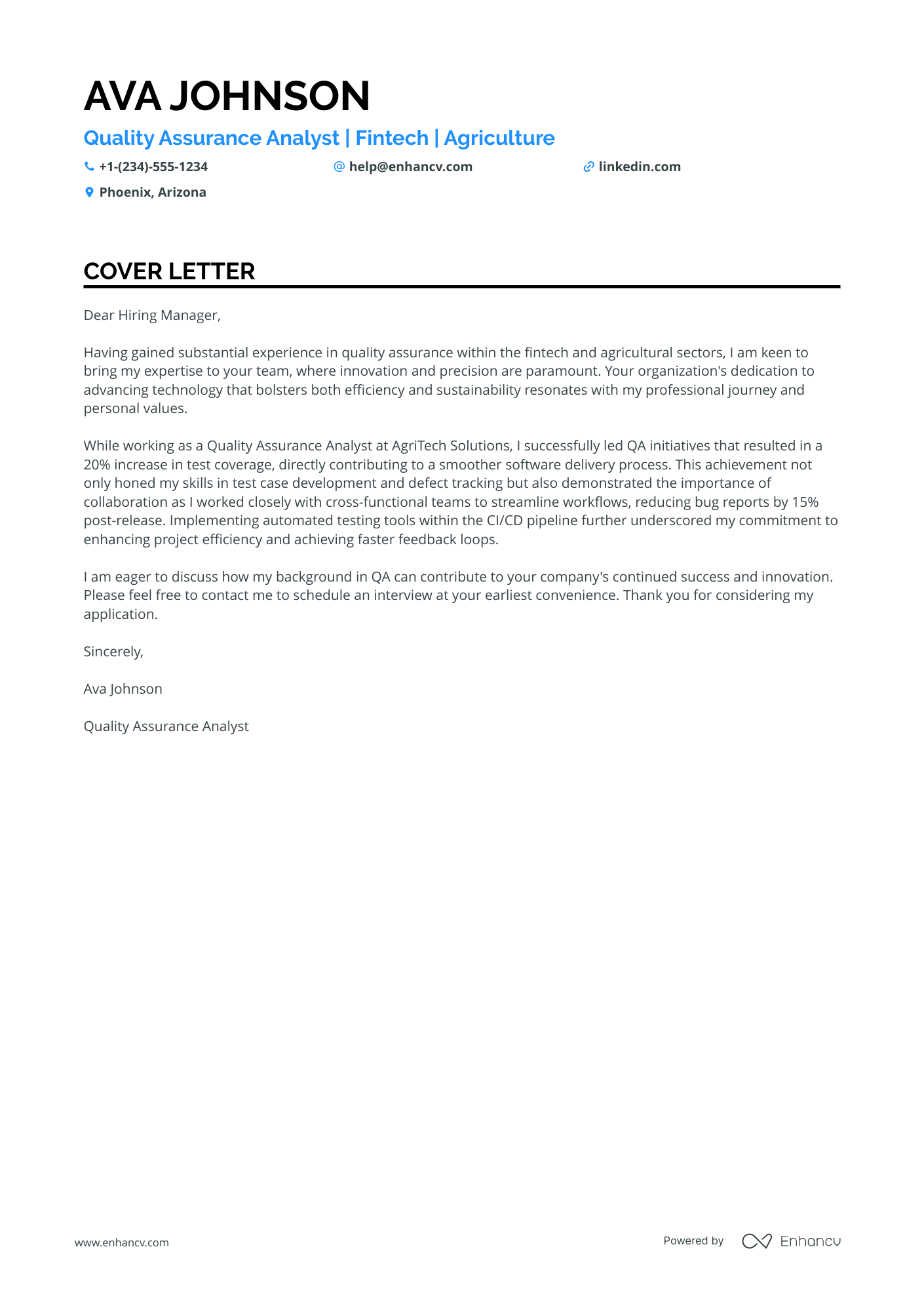Embarking on your job search, you've meticulously updated your resume and scanned for promising QA Analyst positions, only to realize a compelling cover letter is also required. Crafting this vital document shouldn't be a mirror of your resume; instead, use it to weave a narrative around your standout professional triumph. Strike a balance between formality and originality, and keep your story tight—your cover letter should captivate, not exceed one page. Avoid the trap of clichés and make your first impression count.
- Create a qa analyst cover letter to persuade the recruiters you're the best candidate for the role;
- Use industry-leading qa analyst cover letter templates and examples to save time;
- Dedicate your qa analyst cover letter space to your best achievement;
- Make sure your qa analyst cover letter meets recruiters' expectations and standards.
Avoid starting at the blank page for hours by using Enhancv's AI - just upload your resume and your qa analyst cover letter will be ready for you to (tweak and) submit for your dream job.
If the qa analyst isn't exactly the one you're looking for we have a plethora of cover letter examples for jobs like this one:
- QA Analyst resume guide and example
- Blockchain Developer cover letter example
- F5 Network Engineer cover letter example
- Developer cover letter example
- IT Support Analyst cover letter example
- Product Support Specialist cover letter example
- IT Intern cover letter example
- Aws Network Engineer cover letter example
- System Administrator cover letter example
- Statistical Programmer cover letter example
- Wordpress Developer cover letter example
Drop your resume here or choose a file.
PDF & DOCX only. Max 2MB file size.
QA analyst cover letter example
Joshua Nelson
Columbus, Ohio
+1-(234)-555-1234
help@enhancv.com
- Emphasize relevant experience and past success: The cover letter highlights the candidate's accomplishment of reducing regression testing times and improving product quality metrics, directly relevant to the quality assurance role.
- Demonstrate impact on team and company: It showcases the candidate's leadership in adopting an automated toolset and mentoring junior QA analysts, proving the ability to contribute positively to a team and company culture.
- Show understanding of the industry: By focusing on mobile and web applications, and mentioning an "Agile Enthusiast," the candidate aligns with current industry trends and demands, showing that they are up-to-date with the necessary methodologies.
- Personalize the application: The cover letter is addressed directly to the Hiring Manager, indicating that the candidate has tailored the application for the specific company, which can make the application stand out.
What are the basics of the design or format of your qa analyst cover letter?
To start, here's a reminder for you: the Applicant Tracker System (or software that is used to assess candidate profiles), won't be reading your qa analyst cover letter.
Recruiters enjoy reading qa analyst cover letters with a standardized format that uses:
- the same font as the resume (e.g. modern ones like Raleway or Volkhov are prefered over the clichéd Times New Roman or Arial);
- single spacing to keep the content concise and organized (this is all ready for you in our cover letter templates);
- a one-inch margin to wrap around the text, like in our cover letter builder;
- PDF as a file format, as it allows your design (and visual element) to stay the same.
Finally, we can't go on without mentioning the key sections of your qa analyst cover letter.
In the top one-third, make sure to include a header (with your contact information, name, role, and date), a salutation, and an introduction.
Next, follows the heart and soul of your qa analyst cover letter or its body.
End your qa analyst cover letter with a closing paragraph and, if you wish, a signature.
Don’t let cover letters slow you down. Use our free cover letter generator to create one in no time.
The top sections on a qa analyst cover letter
- Header: Include your contact information, the date, and the recruiter's details, which are crucial for the recruiter to easily get back to you and acknowledge that you have addressed the letter to the right person or department.
- Greeting: A personalized salutation addressing the recruiter or hiring manager by name demonstrates your attention to detail and shows your ability to personalize communication, which is important in QA to understand project stakeholders.
- Introduction: Briefly introduce yourself and state the QA Analyst position you are applying for, emphasizing your enthusiasm for the role and the company; this sets a positive tone and aligns your experience with the job requirements.
- Body: Dive into your relevant experience, particularly highlighting your analytical skills, understanding of testing methodologies, and any accomplishments with metrics to quantify your success, as this showcases your ability to effectively evaluate and improve software quality.
- Closing: Wrap up with a strong statement of intent, reiterating your interest in the role and an invitation to discuss how you can contribute to their team, followed by a professional sign-off; QA roles often involve advocacy for quality, and this section can show your persuasive communication skills.
Key qualities recruiters search for in a candidate’s cover letter
- Attention to detail: Crucial for identifying and documenting bugs, discrepancies, and deviations from requirements.
- Analytical thinking: Helps in assessing the software’s performance and diagnosing issues to determine their root causes.
- Familiarity with QA methodologies: Such as Agile, Scrum, or Waterfall to align with team practices and ensure effective testing strategies.
- Technical proficiency: Knowledge of testing tools (like JIRA, Selenium, or TestRail), programming languages, and databases to write and execute test cases.
- Communication skills: Essential for articulating issues to developers, writing clear and concise bug reports, and collaborating with cross-functional teams.
- Adaptability: Ability to quickly learn new technologies and adapt testing practices to meet the dynamic nature of software development projects.
How to greet recruiters in your qa analyst cover letter salutation
As the saying goes, "You never get a second chance to make a first impression."
Write your qa analyst cover letter salutation to be more personalized to the actual hiring manager, who is set to assess your profile by:
- greeting them on a first-name basis, if you have previously communicated with them (e.g. "Dear Sam,");
- using their last name, if you have more formal communication or haven't spoken to them (e.g. "Dear Mr. Harrows" or "Dear Ms. Marshall");
- writing "Dear HR Team" or "Dear Hiring Manager", if you have no clue about who's recruiting for the role.
Search on LinkedIn, Google, or the company website to find information as to the recruiter's name.
In any case, avoid the impersonal "Dear Sir or Madam".
List of salutations you can use
- Dear Hiring Manager,
- Dear [Company Name] Team,
- Dear [Department Name] Team,
- Dear Mr./Ms. [Last Name],
- Dear [First Name] [Last Name],
- Dear Dr. [Last Name],
What to include in those first two sentences, or your qa analyst cover letter introduction
Have you ever wondered what the best way is to present your profile in the qa analyst cover letter introduction?
There's no right or wrong answer if you're being concise and authentic to yourself.
Some professionals start their qa analyst cover letter by:
- congratulating the company - focusing on something impressive, whether that's an award, an industry-leading project, or a key event;
- aligning their passion for the field or industry with the job - if you're enthusiastic about what you do, you'd thus grow your skill set and value as a professional.
What to write in the middle or body of your qa analyst cover letter
Here's where it gets tricky.
Your qa analyst cover letter body should present you in the best light possible and, at the same time, differ from your resume.
Don't be stuck in making up new things or copy-pasting from your resume. Instead, select just one achievement from your experience.
Use it to succinctly tell a story of the job-crucial skills and knowledge this taught you.
Your qa analyst cover letter is the magic card you need to further show how any organization or team would benefit from working with you.
Finishing off your qa analyst cover letter with what matters most
So far, you've done a fantastic job in tailoring your qa analyst cover letter for the role and recruiter.
Your final opportunity to make a good impression is your closing paragraph.
And, no, a "Sincerely yours" just won't do, as it sounds too vague and impersonal.
End your qa analyst cover letter with the future in mind.
So, if you get this opportunity, what do you plan to achieve? Be as specific, as possible, of what value you'd bring to the organization.
You could also thank recruiters for their interest in your profile and prompt for follow-up actions (and organizing your first interview).
QA analyst cover letter advice for candidates with no experience
If you're worried about writing your QA Analyst cover letter and have no professional experience, we sure have some advice for you.
Turn recruiters' attention to your transferable or relevant skills gained thanks to your life and work experience.
Instead of writing about past jobs, focus on one achievement (whether from your volunteering experience, education, etc.) and the skills it has helped you build.
Alternatively, you could focus your QA Analyst cover letter on your career objectives and goals. Always remember to make those relevant to the job you're applying for by detailing how you see yourself growing as part of the company.
Recruiters would be way more impressed with candidates who fit the job profile and can bring about plenty of skills and vision to the table.
Key takeaways
Creating your qa analyst cover letter should be a personalized experience for the role and the recruiter, where you:
- Format your cover letter using the same ATS-friendly font (e.g. Railway) as you did for your resume;
- Greet recruiters, using their name, and follow up with two sentences to introduce yourself, your interest in the role, and to stand out;
- Map out one key success from your career (or life) that has taught you job-crucial skills;
- Substitute your lack of experience with an achievement from your internships, degrees, or volunteering gigs;
- End with a promise for your potential or your availability for an interview.
QA Analyst cover letter examples
By Experience
Junior QA Analyst
- Highlight relevant experience in improving testing processes, which demonstrates the ability to enhance test coverage and operational efficiency.
- Showcase specific achievements, such as the successful development of automation scripts, to illustrate technical skills and contributions to current projects.
- Focus on the company's values such as innovation and excellence to align personal skills and experiences with organizational goals and culture.
- Emphasize willingness to collaborate with the team, highlighting teamwork as a valuable quality in a Junior QA Analyst role.
Lead QA Analyst
- Tailoring to the Company: The cover letter explicitly mentions admiration for Salesforce's innovative approach, demonstrating research and alignment with the company's values.
- Quantifiable Achievements: The letter includes specific metrics, such as reducing manual testing by 50% and QA time by 40%, which provide tangible evidence of the candidate's impact and capabilities.
- Relevant Experience and Skills: It highlights over eight years of specialized experience in QA and test automation, directly relevant to the position, along with specific certifications in agile and selenium testing.
- Leadership Skills: Mentioning the ability to lead cross-functional teams to achieve a 30% reduction in production defects demonstrates not just technical skills, but also leadership and team management abilities.
Senior QA Analyst
- Highlighting Proven Results: The cover letter effectively showcases a quantifiable achievement (improving bug detection efficiency by 25%), demonstrating the applicant's ability to deliver impactful results in quality assurance.
- Emphasizing Technical Skill: By mentioning the integration of advanced automated testing solutions, the applicant underscores their technical proficiency, which is crucial for a Senior QA Analyst role.
- Collaboration and Communication: The letter mentions experience in working with cross-functional teams, highlighting key interpersonal skills necessary for a role that requires articulation of complex technical details.
- Tailored Interest: Expressing specific interest in the company's commitment to delivering exceptional gaming experiences indicates a tailored approach, making the candidate appear more aligned with the company's goals and values.
By Role
QA Analyst Intern
- Highlighting specific achievements: The candidate mentions leading QA initiatives that improved test coverage and reduced bug reports, demonstrating measurable impact.
- Tailoring to the company's mission: The candidate aligns their experience and values with the organization's focus on technological innovation and sustainability.
- Emphasizing relevant skills: The letter discusses skills in test case development, defect tracking, and automated testing, which are crucial for a Quality Assurance Analyst role.












